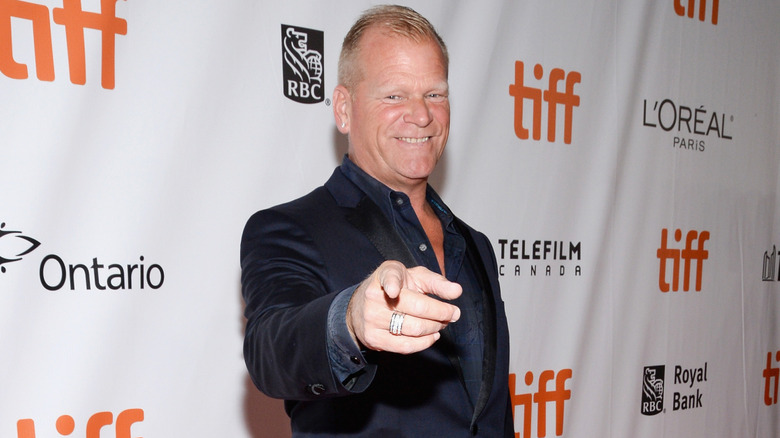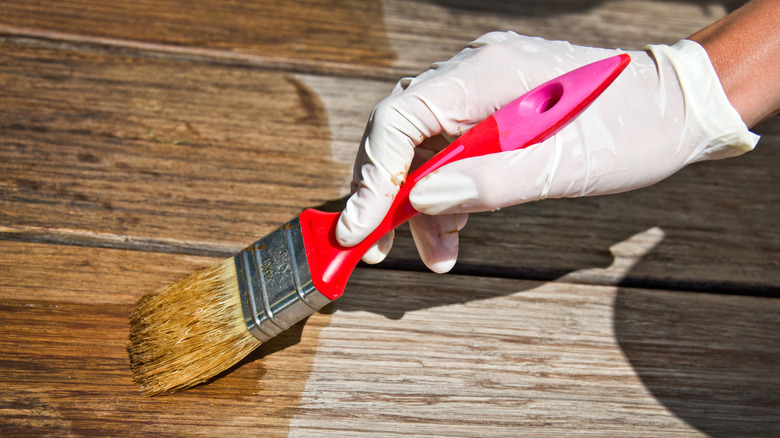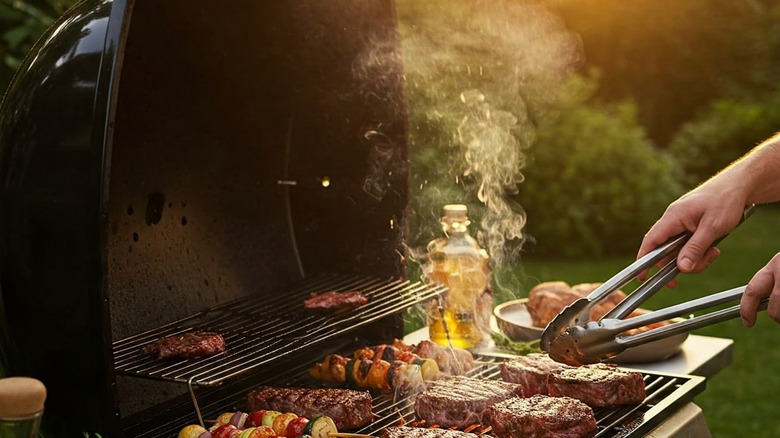Mike Holmes Warns About Waiting To Grill On Your Wooden Deck This Summer
Celebrity builder Mike Holmes has shared so many design hacks for the kitchen through the years, including his top recommendations for a kitchen remodel and the cabinet accessories he swears by for optimal organization in small kitchens. Now that grilling season is in full swing, the home improvement guru is giving expert advice for homeowners who like to cook outdoors. According to Holmes, everyone should think twice before firing up the barbecue on their wooden decks. While he acknowledges that using a grill on a deck can be safe, he also warns that this comes with very serious risks if certain precautions are ignored.
"Here's a question I get asked a lot: Is it safe to use your barbecue on your deck? The answer to that is yes — but you still need to take some precautions," Holmes said in a post he shared via his Make It Right blog. Among his top concerns is the fire risk, especially if a wood deck has been recently treated with stain or sealant. "Use fire pits and grills with care. Glowing coal could fall from barbecues or fire pits and ignite its surroundings. Embers tend to fall out from the ash pans and land on the deck. If you've recently treated your wood deck with a stain or sealant, it can be extra flammable," he wrote. These warnings are quite important during the hot, dry months of summer when wood is more susceptible to ignition, especially newly treated wood.
Why newly treated wood is highly flammable
Mike Holmes' advice on holding off on using the barbecue for a while if you just treated your deck with chemicals makes sense. Whether it's a sealant, stain, or waterproofing agent you use to restore and maintain your deck, these products often contain volatile organic compounds (VOCs) and highly flammable solvents, especially when they haven't fully cured. You need to fight the urge to use your deck right away, even though it looks pristine and ready to use after a day or two. The thing is, many of these wood treatment solutions can take several days or even weeks to dry and fully off-gas, depending on certain factors, like humidity, temperature, and product formulation. Lighting up your grill too soon can expose the treated surface to high heat and open flame, increasing the risk of a fire breaking out in your backyard.
The danger of these wood treatment solutions lies in their chemical composition. Many wood preservatives, stains, and waterproofers include oil-based or alcohol-based solvents, which evaporate slowly and can ignite if exposed to a spark or direct flame. Even water-based treatments can be hazardous if not fully cured, as they may still emit trace amounts of flammable vapors. Additionally, grilling often results in grease drips, falling embers, or flare-ups, which can ignite treated wood surfaces that are still rich in chemical residue. It's not just about avoiding scorch marks, it's about preventing a potentially serious fire. It's best to follow this and other ideas for keeping your grill safe and clean in summer.
Holmes' additional tips for grill placement to ensure safety
Holmes advises setting up the grill on a level patio made of non-combustible materials like brick or concrete, ideally several feet away from the house. That extra distance not only protects your deck but also minimizes the risk of the flames catching on exterior siding, railings, or dry landscaping. According to the National Fire Protection Association (NFPA), nearly 10,600 home fires are started by grills every year — with July being the peak month for such incidents. So, before you roll your grill out for burgers and steaks this summer, think carefully about where it's positioned and whether your deck is really the safest option.
The HGTV star's other important safety tip is about spacing. "Keep the grill a couple of feet from the house, as well as any guardrails and high-traffic areas. Don't place the barbecue under any overhangs or tree branches," he said via his blog. This advice takes into consideration fire dynamics and airflow outdoors. When flames have room to rise and dissipate, they're less likely to spread to nearby structures or vegetation. Many people make the mistake of placing the grill too close to their house, especially on compact decks or balconies, without realizing the risks. Siding can melt, soffits can ignite, and tree limbs can quickly become tinder if they're hanging too close to the grill's heat source. Aside from proper placement, you should keep your BBQ tools and utensils organized with a handy hack to prevent fire accidents.


